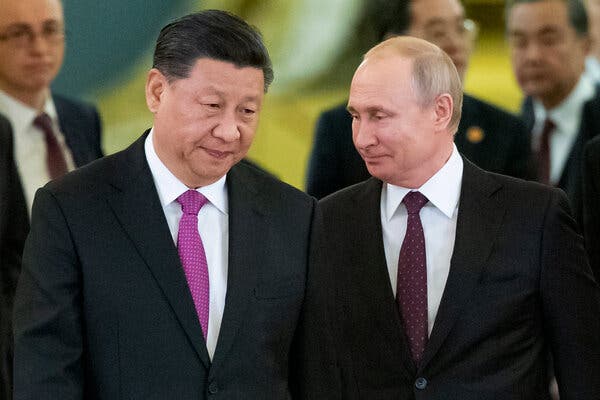
Chinese leader Xi Jinping and Russian President Vladimir Putin meet Friday ahead of the opening ceremony for the 2022 Beijing Olympics, in what is expected to be a show of unity amid each country’s increasingly fraught relationship with the United States.
Though Russia and China do not share a formal alliance, both countries have drawn closer in recent years as they work to counter U.S. influence.
China has been more vocal in supporting Russia, even as Moscow masses more than 100,000 troops along the border with Ukraine, raising fears of a conflict. Russia has demanded Ukraine not join NATO and wants the military alliance to pull back troops from Eastern Europe.
Analysts say Russia-China cooperation could make it harder for the United States to punish Moscow in the event of a Russian invasion of Ukraine.
An increase in U.S.-Russia hostilities could also divert the attention of U.S. President Joe Biden, who has identified China as his biggest foreign policy priority.
However, China may not welcome any major foreign policy distractions, either.
Beijing on Friday will host the opening ceremony for what will be more than two weeks of Olympic events. Perhaps even more importantly, Xi is in the midst of a crucially important season of domestic political maneuvering meant to shape what is expected to be his indefinite rule over China.
“Beijing wants stability and predictability. They will not welcome foreign turbulence,” said Ryan Hass, a China scholar at the U.S.-based Brookings Institution, in a thread on Twitter.
Xi and Putin, two strongman leaders who preside over authoritarian governments, have a long history. This will be the 38th meeting between the two men, according to Beijing.
In December, Xi said he welcomed the visit by Putin, whom he called his “old friend.” Putin was the first international leader to RSVP for the Beijing Olympics, after the United States announced a diplomatic boycott of the Games over China’s abuses against Uyghur Muslims.
In a letter published earlier this week in China’s official Xinhua news agency, Putin slammed the U.S.-led boycott, lamenting “attempts by a number of countries to politicize sports for their selfish interests.” Putin’s letter also declared that the Russia-China partnership had entered a “new era.”
Russia and China have a long history of working together to block U.S. positions at the United Nations Security Council, where all three are veto-wielding permanent members.
Most recently, China and Russia have found common ground over Ukraine. A recent statement by China’s Ministry of Foreign Affairs referred to Russia’s “legitimate security concerns” and called for an end to “Cold War mentality,” a clear reference to what it sees as U.S. foreign policy.
“The Chinese have moved progressively closer to Russian positions,” said Evan Feigenbaum, vice president for studies at the Washington-based Carnegie Endowment for International Peace.
This is a major shift from China. During Russia’s invasion of Georgia in 2008 and its invasion of Crimea in 2014, China was “not leaning so far in toward their partnership with Russia,” Feigenbaum said, speaking at an online forum.
“The China-Russia partnership looks a lot different to an American not just defense planner but strategic thinker than it would have just six or seven years ago,” he said.
However, China has also called for a lowering of tensions over Ukraine and proposed the implementation of the Minsk agreement, a 2014-15 deal to restore peace following a flare-up of violence along the Russia-Ukraine border.
“China is in a diplomatic logjam,” Hass said. “It would face difficulties and unwelcome turbulence from a conflict in Ukraine, but at the same time it wants to preserve strong relations with Russia and it does not want to do the U.S. any favors.”
Source: voanews.com























